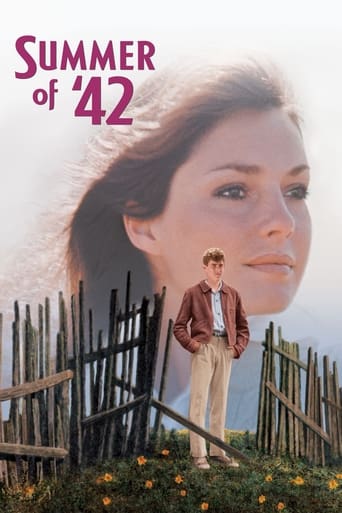calvinnme
...because - outside of the music - the 70s is a decade most of us in America would just as soon forget. There was inflation, an unpopular war, a disgraced president, gas lines, and shag carpet. The thing is, most of the things I just mentioned hadn't even happened yet, but by 1971 there was a feeling that our best days were over and we were in a downhill slide as a country. So it would be natural to look backwards at the 30's - there were lots of A list 70s films set during the Great Depression - and also at the 1940s. Summer of 42 is set at a time when the U.S. didn't know how WWII was all going to turn out, but in 1971 we knew it was our finest hour, and there was a desire to revisit that time.Summer of '42 is a very well-done and entertaining movie. It certainly presents what I would guess is a pretty accurate view of the time and place and what adolescents were like at the time. That for me is its greatest merit. I wouldn't call it a great movie, but it's certainly a good one. I always feel a little sorry for any kid whose nickname is Hermie. Yikes. At first glance "Summer of 42" is merely another coming of age film wherein a teenager falls in love with an "older" woman and lives the summer dream of every adolescent boy, but first glances can be wrong. Gary Grimes delivers a strong performance, but the gem in this movie is Jennifer O'Neil. This stunningly beautiful woman delivers a remarkably haunting performance as the "suddenly" widowed young bride who dream walks into one night of sexual searching with a local teen. Her performance is so sensual yet innocent of any feelings of guilt, her one night is a gentle embrace of life, not sexual release or wantonness, a perfect performance from a actress we got to see far to little of.
disinterested_spectator
In a way, this movie is a companion piece with "The Way We Were" (1973). As I noted in my review of that movie, the scene where Katie first has sex with Hubbell challenges our attitude about rape and the double standard. In that case, it had to do with having sex with someone too drunk to have given consent. "Summer of '42," on the other hand, challenges our attitude about rape and the double standard when it comes to having sex with someone too young to have given consent.With both movies, we pretty much have the same three time periods: the 1940s, when the movies were set; the early 1970s, when the movies were made; and today, when we watch them from the perspective of the twenty-first century. In "Summer of '42," a 15-year-old boy named Hermie falls in love with a 22-year-old woman named Dorothy. One evening, she gets word that her husband's plane has been shot down over France, and he is dead. She and Hermie have sex, and the next day she is gone.I never really cared for this movie, but that is neither here nor there. The sense of it was that Dorothy, in her grief, turns to Hermie for affection, and that what happens is a deeply meaningful and positive experience for him. Now, I don't know what the laws were in Massachusetts in 1942, but I am pretty sure that in most states, if a 22-year-old man had sex with a 15-year-old girl, he would be guilty of statutory rape, and if found out would be sent to prison, especially when the jury was told that he had sex with her on the very night he found out his wife had been killed, for that would make him seem callous. Should we condemn the man but excuse the woman? Did Dorothy deserve to go to prison for rape, just as a man would?Once again, as with "The Way We Were," we have a situation in which there is consent after the fact, in this case, when the boy becomes a man. Does that matter? And if it does, what would our attitude toward Dorothy be if the adult Hermie was psychologically harmed? And once again we have to distinguish between the attitudes existing when the movie was set, when it was made, and the attitudes we have today.Even today, the double standard lends itself to late-night humor. Typical was when Jay Leno was discussing a story about a female teacher that had sex with one of her male students, leading Leno to ask in exasperation, "Where were these teachers when I was in Junior High?" Humor aside, could "Summer of '42" be made today? More to the point, could such a story be told in a contemporary setting? Probably not. But I wonder if that represents a genuine change in attitude, or simply a fear that the movie would not be well received. I, for one, would have a hard time condemning Dorothy, even if the story were set in the present, just as I would have a hard time condemning Katie for what she did to Hubbell, even if the story were set in the present.
daviddaphneredding
In this 1971 Warner Brothers movie, set against the Nantucket Island backdrop of WWII, the nostalgia was great, strongly taking people back to the era of the early 40's. Nantucket was very appealing in this story, the coastal waters being very refreshing as well. As for the acting, Jennifer O'Neill portrayed so well the part of the lady with whom the young teenage boy became so taken. (Gary Grimes acted so well the part of the immature boy taken with her so strongly.) Jerry Houser was definitely an immature boy. But the storyline is not original. In their adolescent years, only a small number of boys do not find themselves fantasizing about some female they come upon and, as in this case, sometimes the women are too "old" for them; Grimes was a high school boy and O'Neill was somewhere in her middle 20's. In short, an adolescent boy meets an attractive older woman, he becomes strongly infatuated with her, and neither knows nor cares how the situation will resolve itself. The ending did and did not surprise me. To recapitulate, I was impressed with the nostalgia, the color and scenery were drawing, but the storyline was mediocre.
All_Is_Well_In_NJ
The last line of the film says it all... the teenage angst, the melancholia that the movie leaves behind, the longing for something better, more fulfilling, yes, even happiness. For me, it left the same feelings that the last episode of the "Wonder Years" TV show did -- life went on without the two who could have been the loves of their lives. "I was never to see her again. Nor was I ever to learn what became of her. We were different then. Kids were different. It took us longer to understand the things we felt. Life is made up of small comings and goings. And for everything we take with us, there is something that we leave behind. In the summer of '42, we raided the Coast Guard station four times, we saw five movies, and had nine days of rain. Benji broke his watch, Oscy gave up the harmonica, and in a very special way, I lost Hermie forever."





